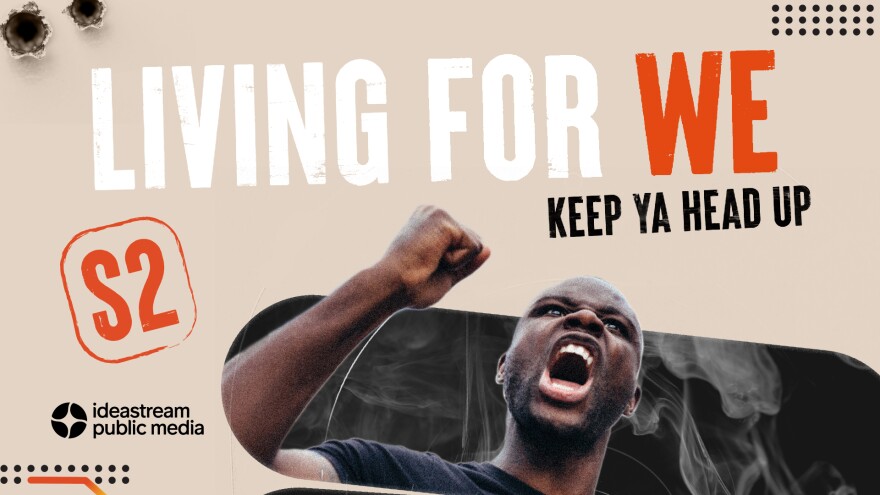Living for We: Season 2 now available

Hear the latest episode:

S2E11: Hope in Akron
In this powerful final episode of this season of Living For We: Keep Ya Head Up , co-hosts Marlene Harris-Taylor and Myesha Watkins turn their focus to Akron, Ohio — a Northeast Ohio city grappling with the harsh realities of gun and police violence. They sit down with community advocate Courtney Brown, founder of Winners and Leaders, and Taylin Ray, a high school freshman who was personally impacted by the violence. Taylin reflects on the loss of his good friend, 15‑year‑old Jazmir Tucker, who was shot and killed on Thanksgiving Day by police. There was an outcry of concern over the controversial incident, but the case is still being reviewed by local officials. Together, they also discuss how Courtney’s after-school program, including a transformative component called Man in the Mirror, is helping young Black boys see brighter paths forward.
Later, the conversation expands to include Minister Stephen Muhammad and Marcel McDaniel of Akron's Street Teams initiative, which uses Credible Messengers — individuals with lived experience — to mentor youth and interrupt cycles of violence.
This episode wraps up a season of emotional, raw, and affirming conversations with Black men and women across Northeast Ohio. Marlene and Myesha reflect on the themes of trauma, resilience, grace, and community power — and share how local heroes are stepping up, even when no one else is coming to save us.
Listen to Season 2: Keep Ya Head Up
In the Cleveland area, and in cities across the country, teens and young adults are dying in our streets – victims of gun violence. There's no question: it’s an epidemic. It's the leading cause of death for teenagers. Young Black men often feel like they a target on their backs. Kids in schools face metal detectors, police presence in the hallways, and shootings at football games. Jr. High students are carrying ghost guns.
This season, we're asking what can be done to reverse cycles of violence and retaliation when shooters value their reputation over their own lives. We know where this violence occurs, we know what drives it. How can we start Living For We and decrease the violence?
Every bullet fired creates two victims: the child in front of the gun, and the one pulling the trigger.
We'll talk with people who are navigating streets where gun violence is normalized – seen as no big deal, while at the same time ruining lives. We'll listen to those fighting for their children and their communities, putting in work to uplift their neighborhoods and create meaningful change. This is more than a podcast, it's a resource for communities tired of chaos and ready to build peace.
Has gun violence impacted you or someone you love? Share your story. Your story might be shared in an upcoming episode.
Featured Story
For years, Cleveland police have told the mostly Black families living in neighborhoods most beset by crime and poverty, like Buckeye, that violence prevention starts with the parents.
They have called on community members to cooperate with police investigations.
They have asked others to address the “root cause” of violence.
Antoine Tolbert, who is known as Chairman Fahiem, and members of New Era, a community activist group that provides armed safety patrols and neighborhood programs around Buckeye, say they are picking up that torch.
Ideastream Public Media’s Engaged Journalism team partnered with four community organizations, and paid for their services, to help organize listen-and-learn sessions about gun violence with community members in Cleveland, Akron and Lorain in 2023 and 2024. Information from those sessions helped inform coverage of gun violence, including the podcast, "Living for We: Keep Ya Head Up." New Era Cleveland, and its partner organization, The Love Project Movement, Inc, was one of those groups.
Resources
This is more than a podcast, it's a resource for communities tired of chaos and ready to build peace. Click here to see a list of resources.
Season 1

In 2020, cityLAB of Pittsburgh released a study that ranked Cleveland dead last in terms of livability for Black women. On Living For We, we talk to Cleveland's Black women about their experiences at work, at school, in the doctor's office, and in community with each other in an attempt to answer the question... is Cleveland really as bad as they say it is for Black women?
Award-winning podcast
Living For We has received the following honors:
- Regional Murrow Award: Excellence in Diversity, Equity, and Inclusion
- Webby People's Voice: Diversity, Equity & Inclusion
- Davey Awards: Diversity, Equity & Inclusion (Gold), Series (Gold), Society & Culture (Silver)
- W3 Awards: Cause Awareness (Gold)


